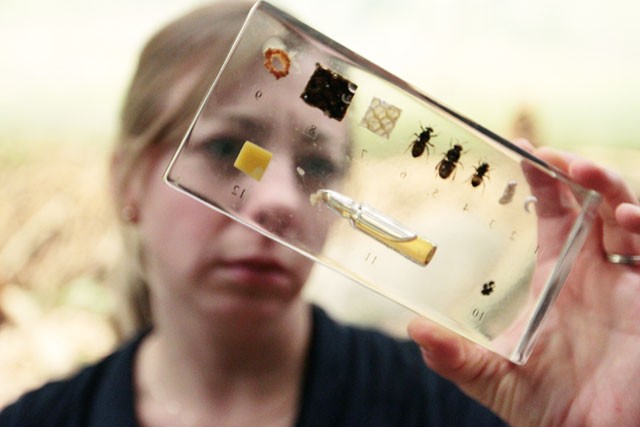After he got a beehive as a Christmas present 18 years ago, Jim Kloek started a hobby that became a business âÄî beekeeping.
Kloek demonstrated beekeeping equipment from his Stillwater business, NatureâÄôs Nectar, to the Bell Museum of Natural History on Saturday where more than 200 aspiring beekeepers turned out for a course on the burgeoning topic.
“More people are noticing the importance of bees and [are] showing an interest,” Kloek said.
Surrounded by glass exhibits of Minnesota animal life, participants tasted honey and checked out equipment for starting their own colonies.
The University Extension course, “Beekeeping in Northern Climates,” takes students through two years of beekeeping in two days and is run by University of Minnesota entomology professor Marla Spivak, recent winner of the MacArthur FoundationâÄôs “genius grant,” and scientist Gary Reuter.
After a daylong lecture on the essentials of getting a bee colony up and running, the participants were invited to take part in a more hands-on component of the course.
Guest vendors showed aspects of the beekeeping industry, from honey wax candles to beeswax cosmetics. Kloek, one of the vendors invited to the program, said beekeeping is just a hobby, as it is for many taking the course. But some do it for commercial interests, such as pollinating other crops.
“This is peopleâÄôs livelihood,” Kloek said.
The course has been run annually by the UniversityâÄôs Department of Entomology since 1922. Recently, itâÄôs been getting about 160 participants every spring. Due to a sudden large increase in applicants, this yearâÄôs course was split in half, with the fall section for beginners only.
People sign up from all over the state, and some come from Wisconsin and neighboring states.
Participants come from a variety of backgrounds.
Victoria Sass, a University graduate who got her degree in interior design, said she has been interested in beekeeping for a while.
“Everyone needs a hobby,” Sass said.
Nathan Bouma, another participant, got interested through another pastime. Bouma brews his own mead, which requires honey, and was looking to save on expenses. After attending the course, Bouma said heâÄôs definitely looking to manage a bee colony of his own.
At the end of the dayâÄôs lecture, Spivak took a few minutes to talk about University bee research.
Minnesota is a major honey-producing state, Spivak said, and is one of the only states in the Midwest where bee research is conducted.
Spivak hopes for a new bee research facility at the University, for education and further studies in the field.
“Bees,” Spivak explained, “are like a portal into everything âĦ an entryway into so many interesting things.”


